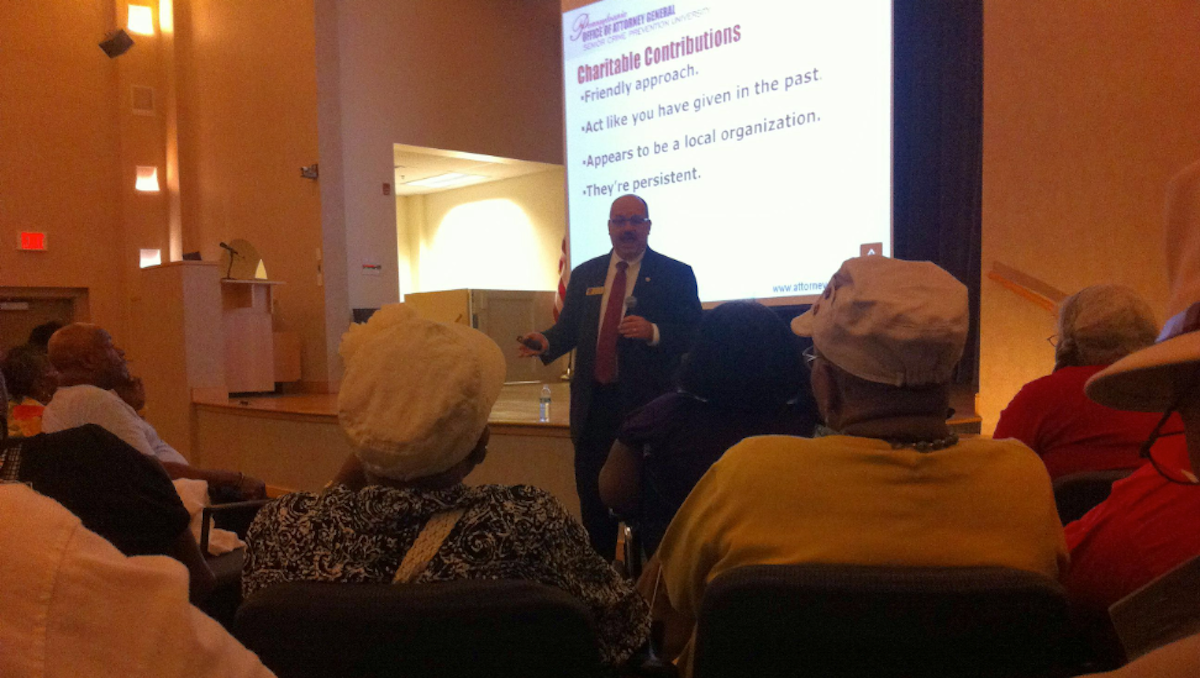Senior advocates share advice for staying safe and avoiding scams at Mt. Airy seminar

David P. Shallcross, education and outreach specialist at the state Office of Attorney General, gave a talk titled 'Senior Crime Prevention University' on Thursday. (Michael Buozis/for NewsWorks)
An elderly woman sits in her home in Germantown. The phone rings.
“Hi, Grandma. It’s me. I need your help,” says the voice on the other end of the line, sounding like it could be her grandson, but something seems off.
He tells her he needs her to wire money. He’s in trouble.
“I was in an accident. The phone connection’s bad,” says the man who sounds relieved when she refers to him by her grandson’s name. “Yeah, Grandma, it’s me. Of course.”
She follows the directions, but the next time she sees her grandson, he doesn’t know anything about it.
She has been scammed.
An all-too-common victimization
This story — and many different variations on the same theme — was shared at Thursday’s senior-safety seminar at the New Courtland Education Center.
Nearly 100 seniors registered for the day’s free programming which was part of the Philadelphia Police Department’s first Senior Safety Week. The department conducted five other events throughout the week, one in each of the city’s six police divisions.
Officer Roz Downing, project-development specialist, said the recent rise in home invasions and seniors’ vulnerability to scams and fraud inspired her to help organize the event.
The aim was twofold: Raise awareness and connect seniors with support services they might not know about.
“The department is building a relationship with the many different organizations that advocate for seniors,” said Downing. “We want to incorporate this into our normal crime-prevention capacity.”
Seminar specifics
Representatives from 14 senior-advocacy groups set up informational tables and spoke with attendees at the Northwest Philadelphia event.
That list included AARP, Community Legal Services (CLS), Senior Law Center and the Center for Advocacy for the Rights and Interests of the Elderly (CARIE).
In New Courtland’s auditorium, David P. Shallcross, education and outreach specialist at the state Office of Attorney General, gave a talk titled Senior Crime Prevention University. He offered tips and advice on fraud and scam prevention.
“If your phone’s ringing, don’t go singing,” he told the group.
Shallcross spoke in the booming cadences of a preacher and kept the crowd engaged with personal anecdotes and numerous call-and-response questions.
Types of scams
Shallcross cited five common varieties of scams: Requests for charitable contributions, offers of sweepstakes or lottery winnings, fake checks or money orders, credit-card account verification and some variation of the “grandparent scam” described above.
“The large print giveth and the small print taketh away,” Shallcross said.
He recommended that seniors, and anyone targeted by a scam, think before they act.
Hang up the phone or put away the sweepstakes check and do some research. If you can’t verify that the request is legitimate, never send money or share any information with strangers, he said.
“Remember the acronym ‘SCAM,'” he said. If a solicitor makes ‘Sudden Contact’ and urges you to ‘Act’ now and requests ‘Money’ or information, “these are all indicators of a scam.”
The event, which was provided free of charge, drew seniors from all over the Northwest.
Downing’s grandmother Catherine E. Talley attended with her daughter and son-in-law, Gail and Jay Jackson.
They said they haven’t been targeted, but have noticed increased reports about seniors being victimized.
“We’re here to learn how to protect ourselves at home,” Gail Jackson said. “You see on the news how people take advantage of older people and force their way into their homes and rob them.”
Advice offered
Both CARIE and CLS provided information about their free legal services for seniors.
The former group helps seniors who are victims or witnesses in trials, said Karen Chenoweth, supervisor of CARIE LINE, the organization’s hotline and online support service.
CARIE representatives accompany seniors to court, explain any complicated legal procedures and provide no-cost transportation.
They also encourage seniors to provide victim-impact statements to the court, which can influence judges or juries to impose stronger sentences on offenders.
“Many of the seniors we assist are vulnerable to financial exploitation,” said Chenoweth. “They might not be hip to the new technologies and they might be acting out of kindness, but they can get taken advantage of.”
Thu Tran, supervising attorney at CLS, said she advocated for seniors in danger of losing utility services.
“In terms of individual seniors,” said Tran, “keeping utilities on is a key health and safety issue.”
For all essential utilities — electricity, gas and water — anyone earning less than 150 percent of the federal poverty level ($35,775 for a family of four or $17,505 for a single person) qualifies for reduced bills under the Customer Assistance Program.
Many seniors qualify, said Tran, but either don’t know about it or are unable to navigate the sometimes-confusing application process.
“The utility companies are not as always forthcoming [about this program] as we’d like them to be,” said Tran.
She also noted that customers should use caution when signing on with electricity suppliers other than PECO, as alternative suppliers often offer variable rates which can increase over time.
“Some people are not aware of what they are getting into,” said Tran.
Call the Office of Attorney General’s hotline with questions or to report senior abuse at (866) 623-2137. Seniors can request free legal help from Community Legal Services by calling (215) 227-2400 or seek advice and assistance from CARIE by calling (215) 545-5728.
WHYY is your source for fact-based, in-depth journalism and information. As a nonprofit organization, we rely on financial support from readers like you. Please give today.





